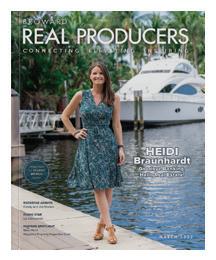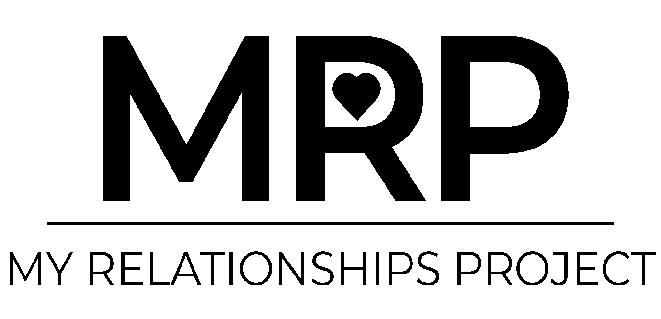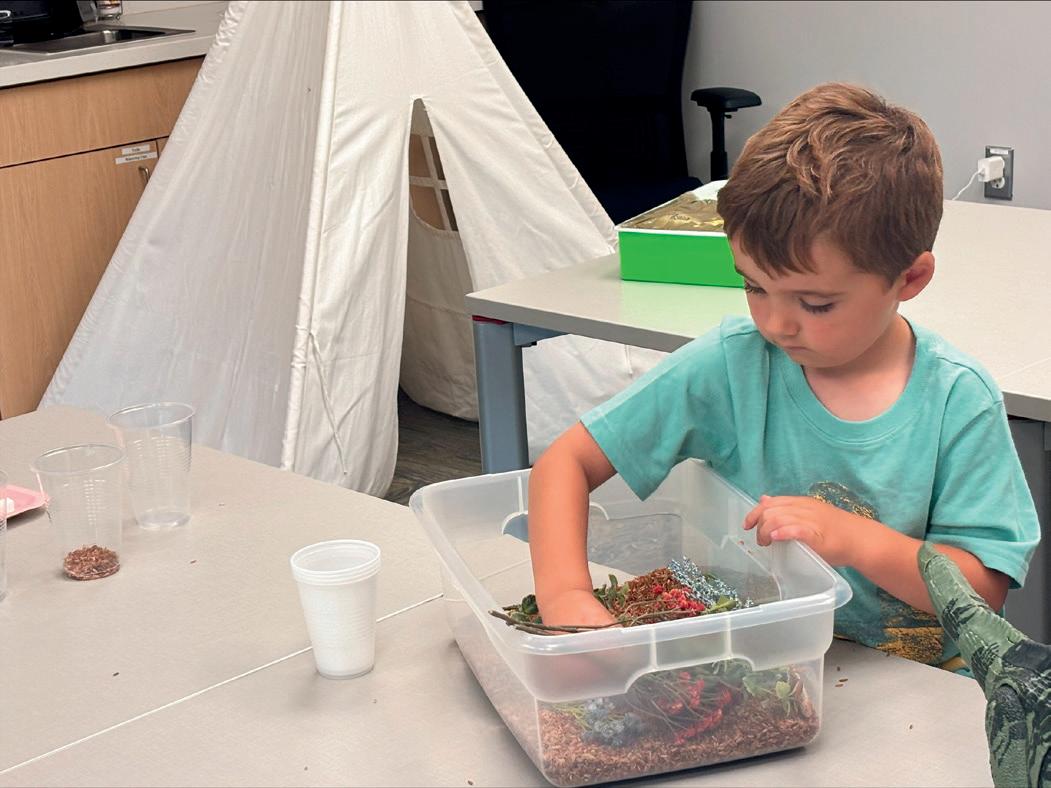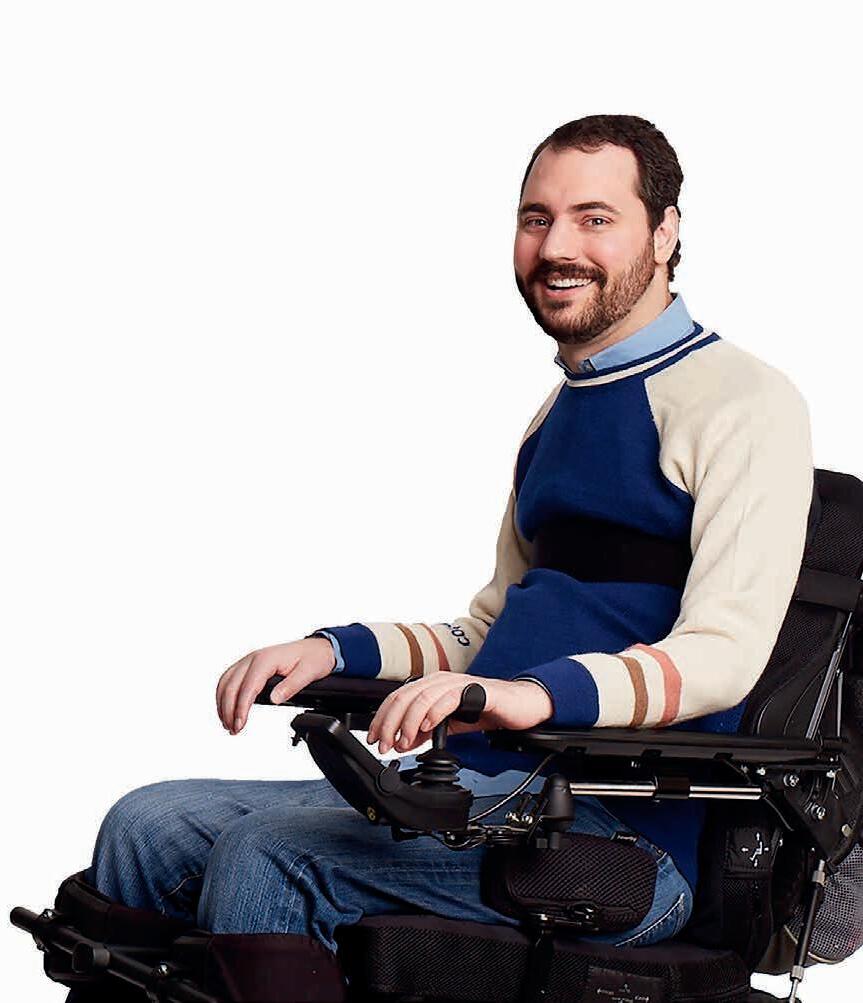
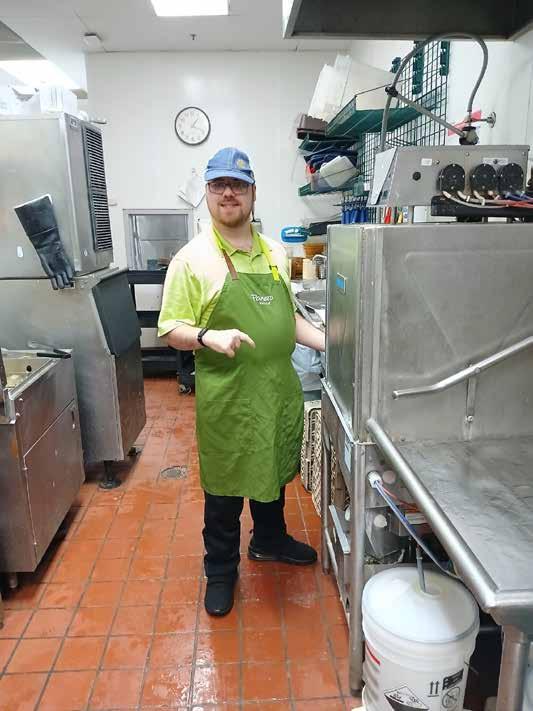
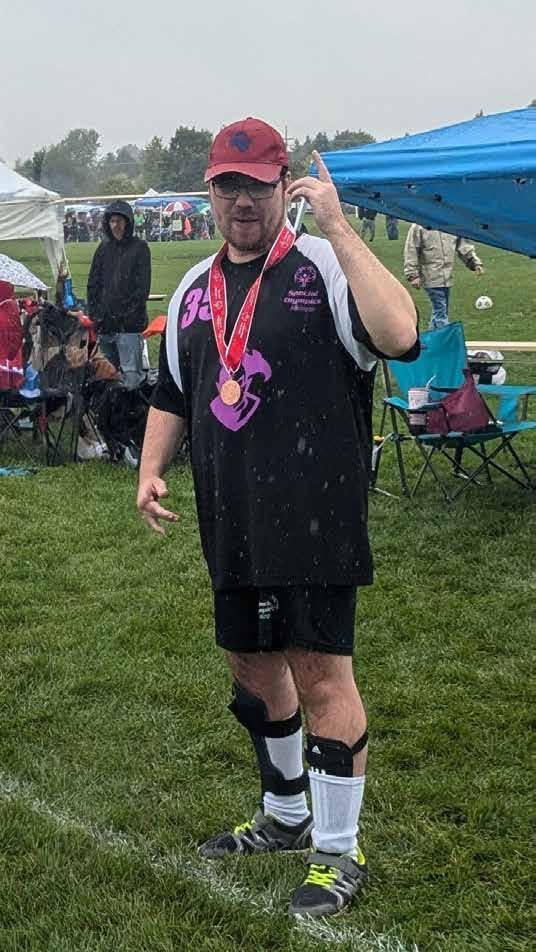




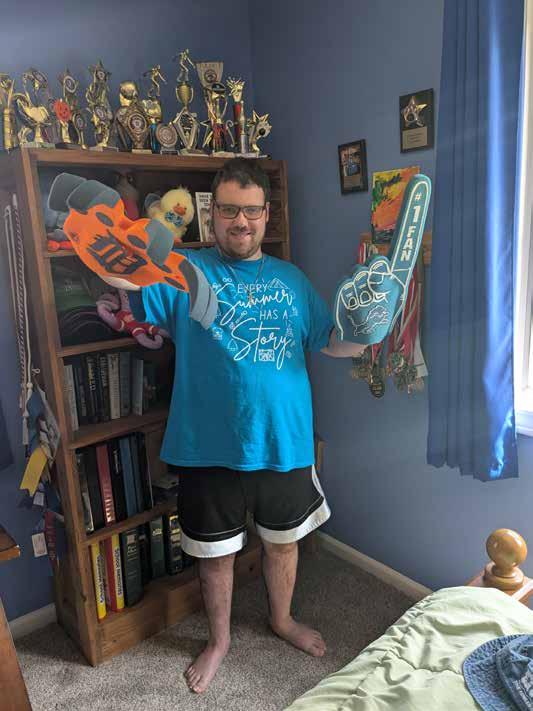







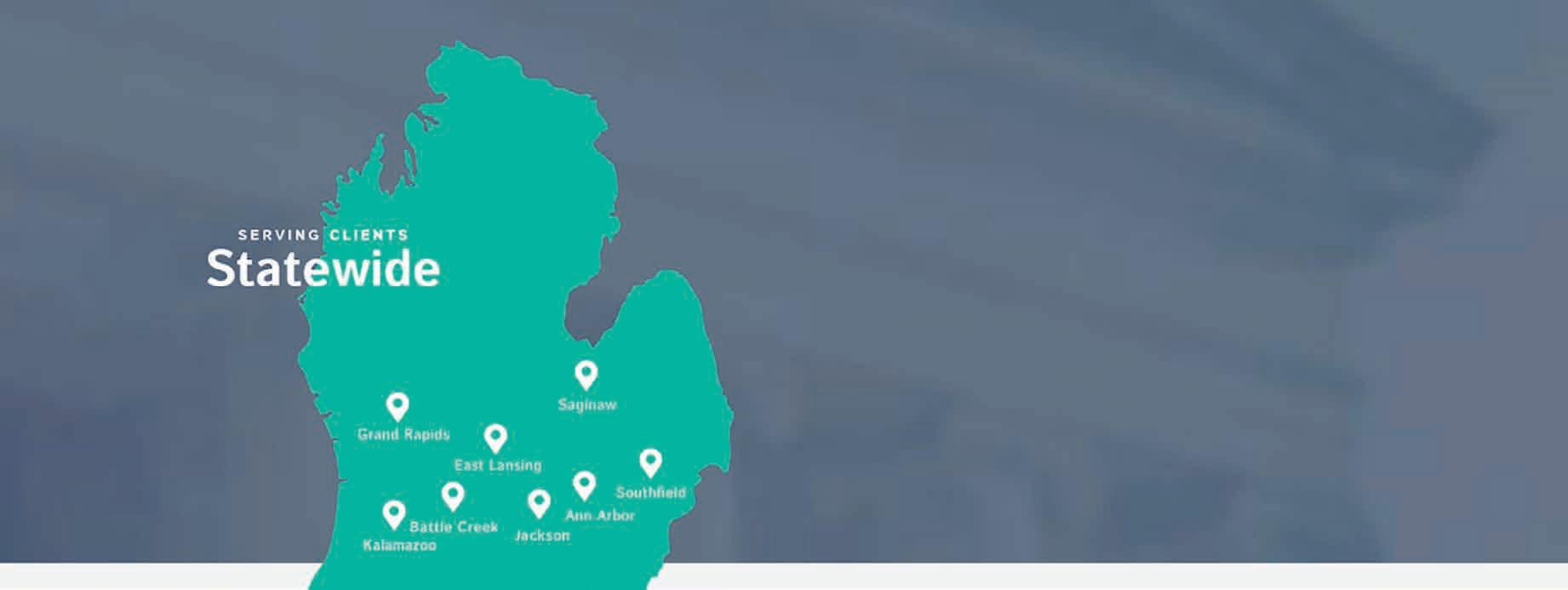

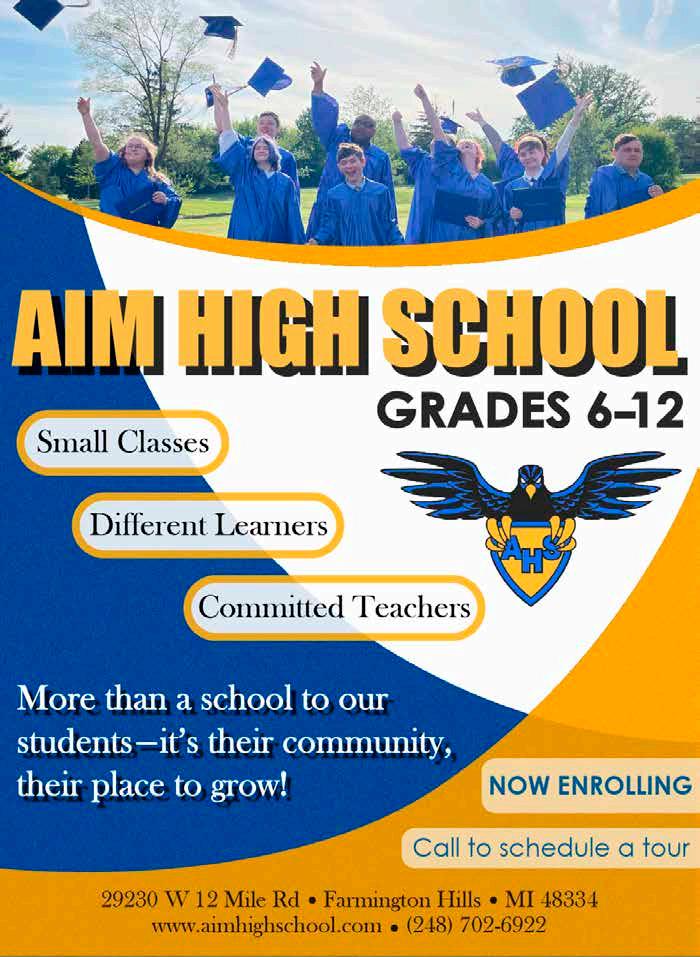
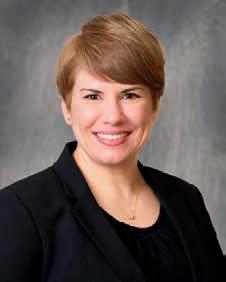



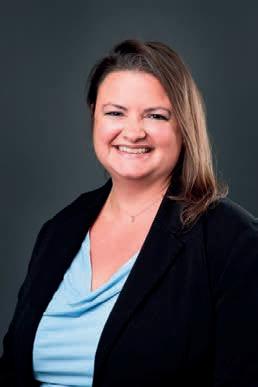
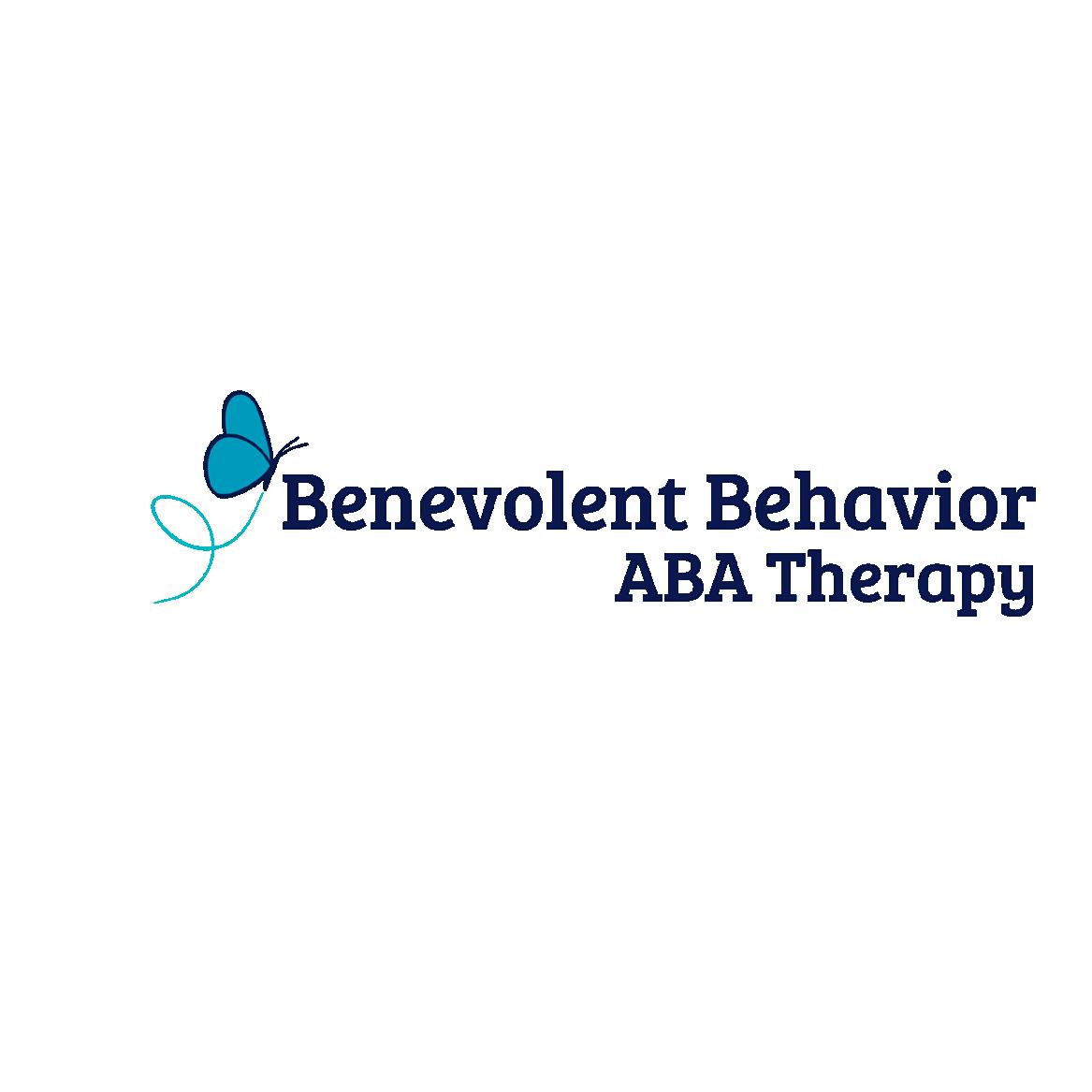

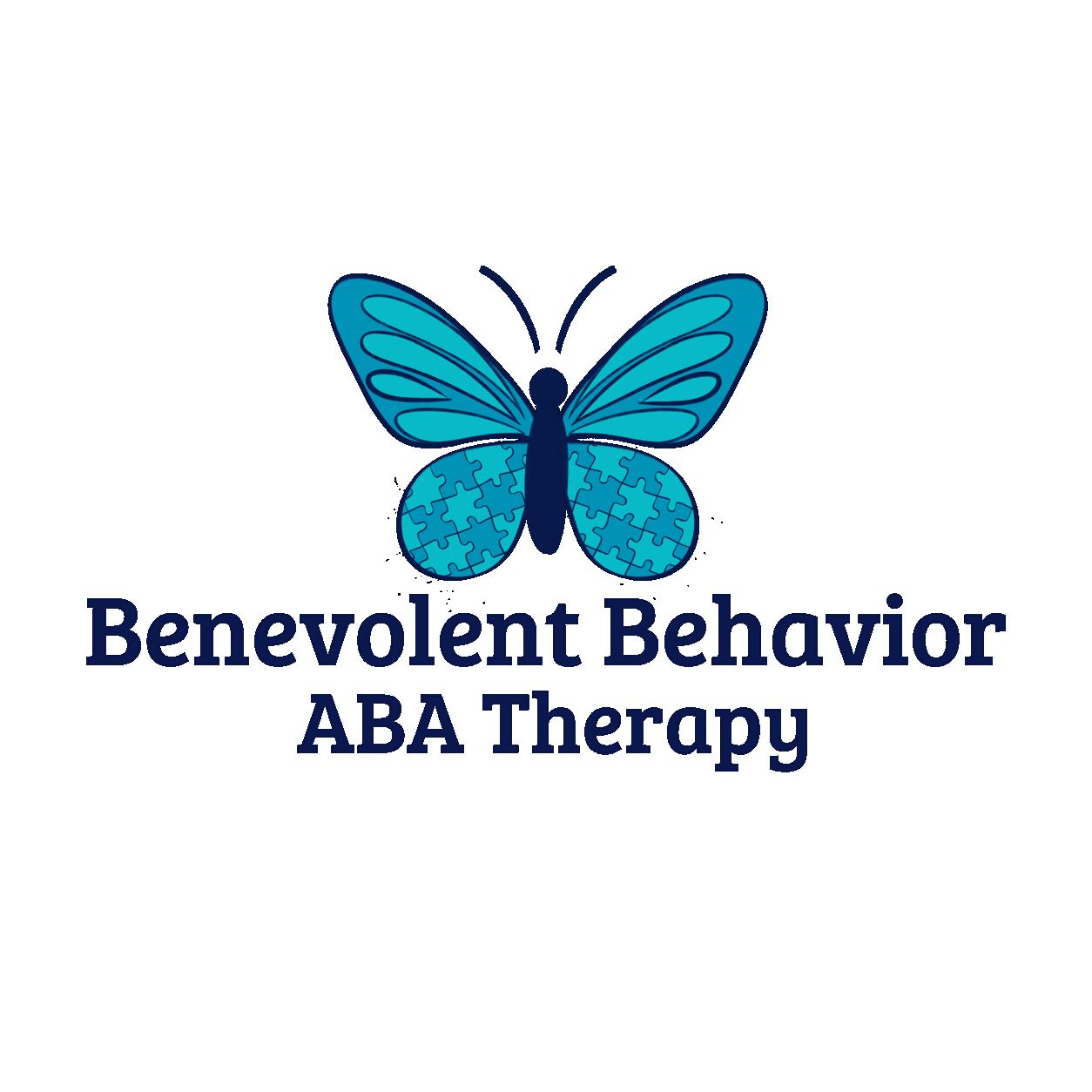
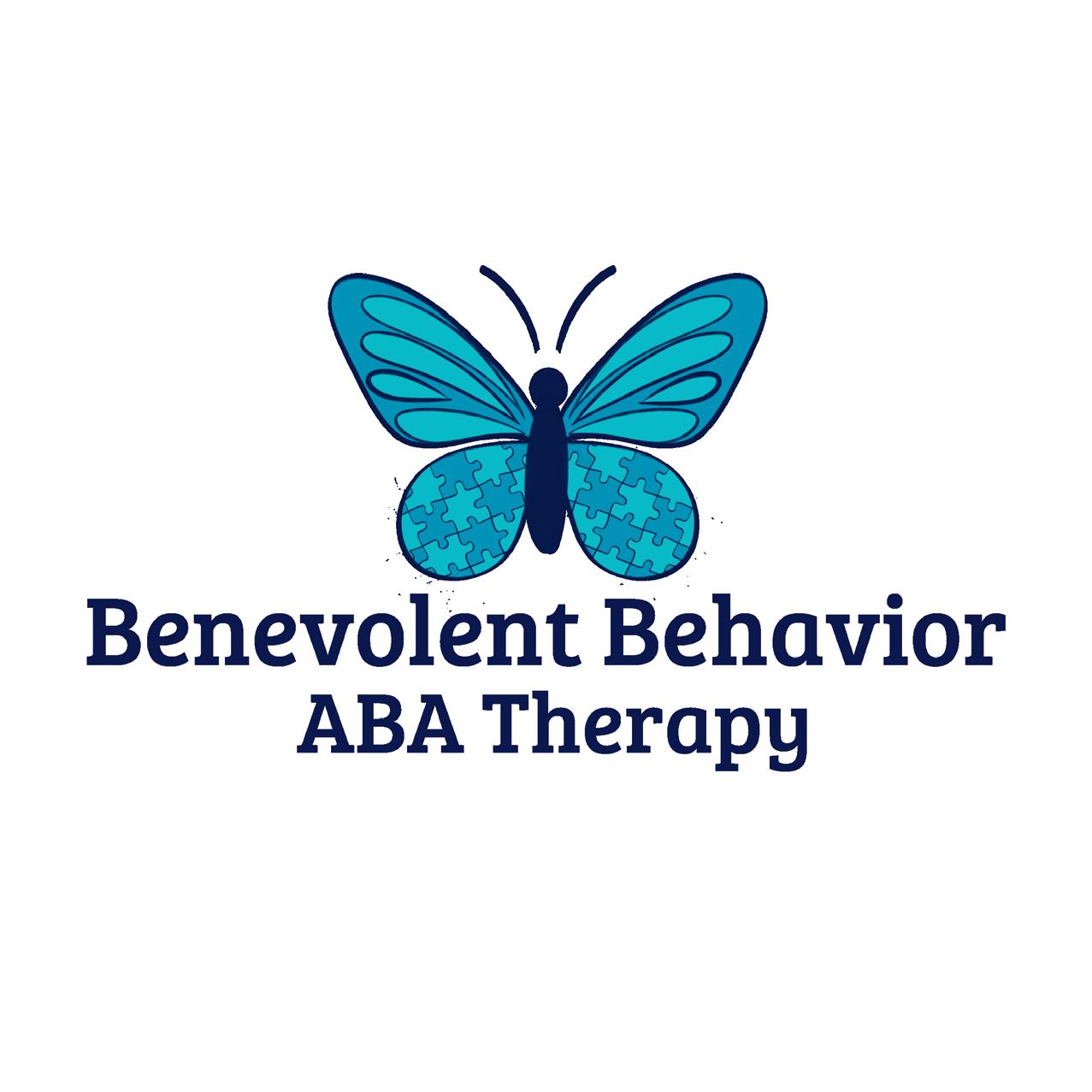

• Page 5 Meet Our New Team Members!
• Pages 7-8 Publisher’s Note: Connecting Communities Through Uniquely You
• Page 9 See What’s Happening at STEP!: STEP Celebrates National Disability Employment Awareness Month
• Pages 10-12 Your Story Matters!: Meet Chris Butts
• Page 13 Advocate Like A Mother: Staying on Top of Your Child’s IEP: A Parent’s Guide to Monitoring Progress
• Pages 14-15 Judson Center: Common Myths & Facts about Autism:
• Page 15 You’re Invited!: Uniquely You A Sensory-Friendly Family Event at Sterling Heights Public Library
• Pages 16-17 A Picture Is Worth A Thousand Words: In Honor of Down Syndrome Awareness Month
• Page 17 Celebrating World Cerebral Palsy Day and National Physical Therapy Month
• Pages 18-19 Healing Haven: Halloween and Autism: 6 Ways to Prepare Your Child
• Pages 20-22 Good Goals/Objectives Are Special Education’s “Keys to the Kingdom”
• Page 23 Chapters of Change: Ellie Haycock Is Totally Normal by Gretchen Schreiber
• Pages 24-25 Nonprofit Spotlight:GiGi’s Playhouse-Detroit
• Pages 26-29 Local Events

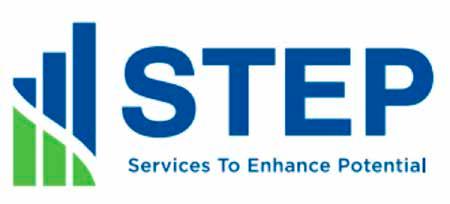
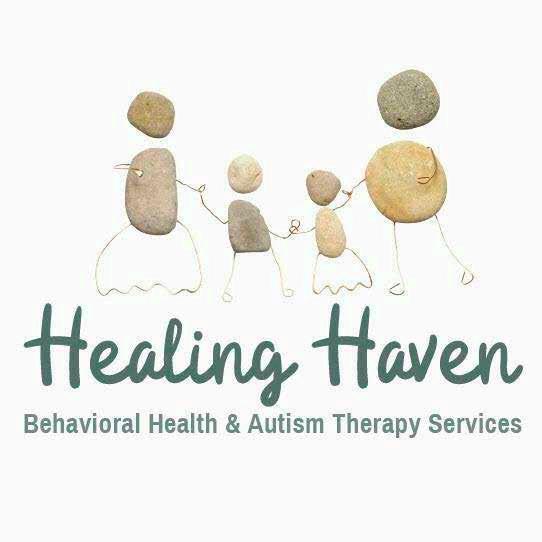
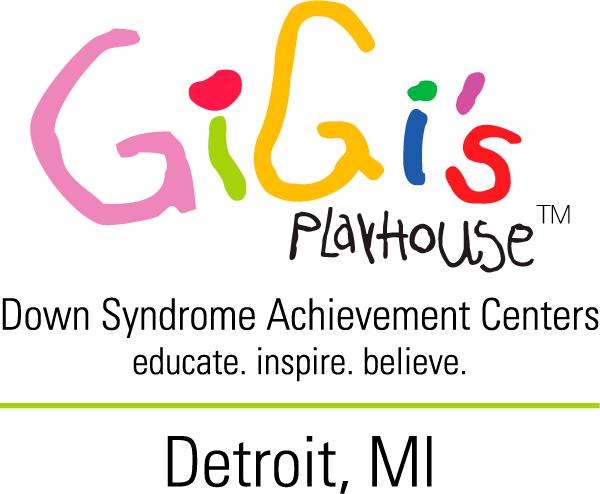



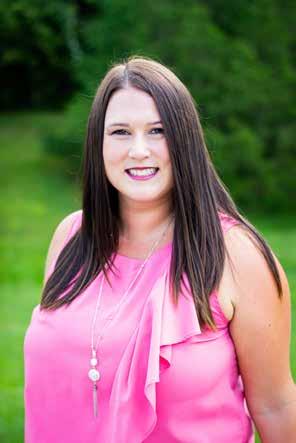






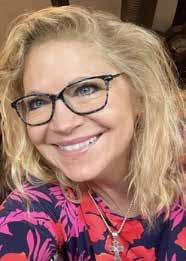


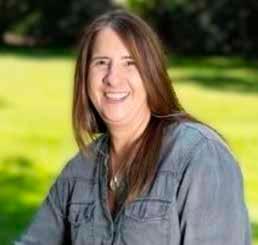






Hi everyone, my name is Christopher Butts. I am 29 years old. I reside in Chesterfield Township, Michigan. I have what is known as Cerebral Palsy. I have had it since birth. Cerebral Palsy is a disability where one side, in my case, my right side, isweaker than my left.
A couple of years ago I discovered my love and passion for writing, and thought “hmm, how can I use my passion to help others?” That was when it hit me.
I started my own writing Facebook group about 11 months ago, and that ultimately is what spurred my ambition to want to join the Uniquely You team to help others and make a difference.

Ashley Ferrell is a devoted wife, mom, and advocate based in Holland, Michigan. After her daughter Addy survived Late-Onset Group B Strep, Meningitis, and a Severe Traumatic Brain Injury as an infant, Ashley became a passionate voice for the special needs community.
She balances life with her husband Denny and their two children, Addy (4) and Caden (2), engaging in therapies, school, and equine programs. Ashley is also a photographer with a heart for giving back—hoping to expand her impact through volunteer work and deeper involvement in disability advocacy.
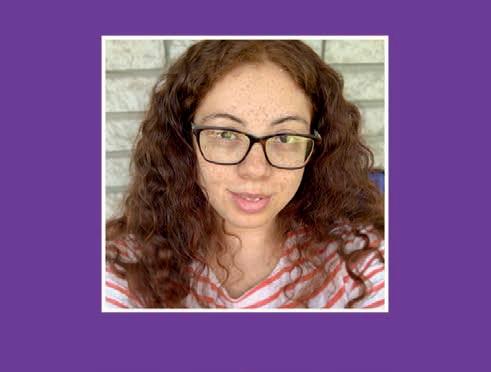
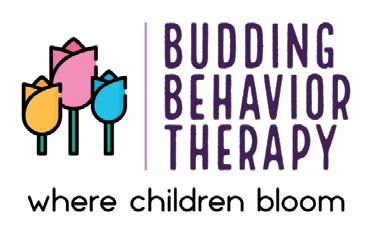
n2co.com
Celebrate. Connect. Impact. © 2025 The N2 Company, Inc..
517-487-5426
877-463-2266
517-882-2800
517-241-3740
269-345-1913
517-241-3740
Arc Michigan arcmi.org
Autism Alliance of Michigan https/autismallianceofmichigan.org/
Autism Support of Michigan https/autism-mi.org/
Behavioral Health and Developmental Disabilities Administrationwww.michigan.gov/mdhhs/ keep-mi-healthy/mentalhealth/procurement/ welcome-to-behavioral-health-and-developmentaldisabilities-administration
Michigan Foundation for the Blind and Visually Impaired
Michigan Developmental Disabilities Council www.michigan.gov/mdhhs/keep-mi-healthy/ mentalhealth/developmentaldisability
800-605-6722
517-333-6655
616-732-7358
269-337-3600
517-241-3740
517-241-3740
800-75-SEALS
Michigan Rehabilitation Services (MRS)
Capital Area Down Syndrome Association www.cadsa.org
Deaf and Hard of Hearing Services (DHHS) www.deafhhs.org/
Disability Determination Bureau Division of Aging www.michigan.gov/mdhhs/adult-child-serv/adultsand-seniors/behavioral-and-physical-health-andaging-services/aging-services
Division of Family Resources (DFR) www.michigan.gov/mdhhs Easterseals MORC www.easterseals.com/MORC/

Would you like to advertise in Uniquely You! to share valuable information and help support the community?
Scan to grab some time to connect & learn more about being involved: https:// calendly.com/ jamie-mccabe/ special-needsliving-magazine

Scan to view the past issues of Special Needs Living and Uniquely You!

Scan to view past digital copies, find resources, share a story or learn more about being involved.

Jamie Olson: Uniquely You! Magazine Area Director jamie.olson@ n2co.com 248-882-8448
911
833-633-5788
833-633-5788
517-374-1171
269-345-1913
517-241-3740
517-241-3740
517-241-3740
833-808-7452
800-457-4584
313-446-4444
988
517-241-7004
517-284-7290
800-772-1213
1-800-772-1213
833-633-5788
517-203-1200
517-241-5324
Emergency
Ealy On Michigan
https/www.michigan.gov/mde/services/earlylearners-and-care/special-ed-05/early-on-michigan
Michigan Department of Education: Office of Special Education https/www.michigan.gov/mde/services/ special-education-
Michigan Family Forum
Michigan Family to Family www.f2fmichigan.org/
Michigan Foundation for the Blind and Visually Impaired
Michigan Department of Health and Human Services www.michigan.gov/mdhhs
Michigan Family and Social Services Administration (FSSA) www.michigan.gov/mdhhs
Michigan State Department of Health www.michigan.gov/mdhhs
Michigan Statewide Independent Living Council (MSILC) www.misilc.org/
Medicaid Disability
MI Choice Waiver Program
National Alliance on Mental Illness
Preschool & Out-of-School Time Learning www.michigan.gov/mde/about-us/mde-divisions-andoffices/preschool-and-out-of-school-time-learning
Self-Advocates of Michigan (SAM)
Social Security Administration (SSA)
Social Security Disability Insurance (SSDI)
Special Education Questions
United Cerebral Palsy Association of Michigan ucp@ucpmichigan.org
Vocational Rehabilitation Services (VR)
DISCLAIMER: The views expressed in the articles and advertisements in Uniquely You are those of the authors and advertisers and do not necessarily reflect those of The N2 Company or the publisher. Inclusion of paid advertisements does not imply endorsement, and neither N2 nor the publisher is responsible for the business practices of advertisers. Uniquely You is for general informational and entertainment purposes only and is not intended to provide medical, therapeutic, educational, or legal advice. Always consult qualified professionals regarding the care and support of individuals with disabilities.
We’re proud to showcase businesses that share our commitment to fostering local connections. When perusing our pages, keep an eye out for the “Local Sponsor” icon to identify articles highlighting these valuable partners. Please note that businesses profiled may have provided free products and / or services for the review.
When Uniquely You first began, the vision was simple yet powerful: to create a space where individuals and families in the disability and special needs community could find encouragement, resources, and connection. Today, it’s a joy to see this vision come to life each month—not only here in Indianapolis through Uniquely You Indy, but now also in Detroit Metro through Uniquely You Michigan.
Our mission has always been to uplift and empower families by sharing stories that matter, celebrating milestones, and connecting people with the tools and resources they need to thrive. Every issue of Uniquely You is built with care, with the hope that it becomes more than a magazine—it becomes a trusted companion on your journey.
To our sponsors and partners thank you. Your support is what makes this resource possible month after month. Because of your generosity, Uniquely You is available at no cost to families, ensuring that everyone who needs this resource can access it freely. You help us provide valuable information on therapies, community events, organizations, and programs that make a real difference in people’s lives. Thank you for investing in this mission and for helping us strengthen the communities we serve.
To our readers—you are the heart of this publication. Your feedback, encouragement, and stories remind us why we do what we do. When we hear that a resource you discovered in our pages opened doors for your family, or that a story gave you hope and encouragement, it reaffirms that this work is more than just words on

paper—it’s about connection, trust, and belonging.
To our writers, contributors, and photographers—you bring voice and vision to this mission. Your words and images give depth to our pages, reflecting the strength, resilience, and beauty of the disability community. Whether it’s a parent sharing
hard-earned wisdom, a self-advocate telling their story, or an organization showcasing their impact, you remind us each month that our communities are rich with inspiration and hope. Each issue of Uniquely You is filled with opportunities to grow and connect. From local events to educational articles, from celebrating birthdays and
milestones to highlighting inclusive programs, our goal is always the same: to help families feel better informed and more connected. No one should ever feel like they are walking this path alone. Through Uniquely You, we aim to ensure every individual and family knows they are seen, valued, and supported.
As a mom raising a son with special needs, this work is deeply personal to me. I know the challenges that come with navigating services, searching for resources, and finding a sense of belonging in the community. I also know the joy of celebrating milestones that others may overlook, the relief of finding the right support, and the importance of being connected with people who understand. That is why Uniquely You is such a blessing—not only for families like mine, but for the broader community that longs for stories of hope, resilience, and inspiration.
What began with Uniquely You Indy has now expanded with Uniquely
You Michigan – Detroit Metro, and this is only the beginning. The need for resources, connection, and celebration exists everywhere. We believe every community deserves a platform where families can find support, where organizations can share what they offer, and where the voices of individuals with disabilities can be heard and celebrated.
If you or someone you know would be interested in bringing Uniquely You to your local community, I invite you to reach out. This is more than a magazine—it’s a movement. Together, we can continue to grow this mission across the country, ensuring that families everywhere have access to the resources, connections, and encouragement they need.
At the heart of Uniquely You is a simple truth: we are better together. When we share our stories, we remind one another that we are not alone. When we celebrate milestones and share resources, we lift each other up. When we
connect, we strengthen not only our families but the entire community.
From the bottom of my heart, thank you. Thank you to our sponsors for your faithful support. Thank you to our readers for trusting us to be part of your journey. Thank you to our writers and contributors for bringing this vision to life. And thank you to every family and individual who makes this community so vibrant, resilient, and inspiring.
It is an honor and blessing to bring Uniquely You to you each month. Whether you are reading Uniquely You Indy or Uniquely You Michigan, I hope you feel encouraged, supported, and reminded that you are not alone. You are seen. You are celebrated. And most importantly, you are uniquely you.
With deep gratitude,
Jamie Olson Publisher, Uniquely You Indy
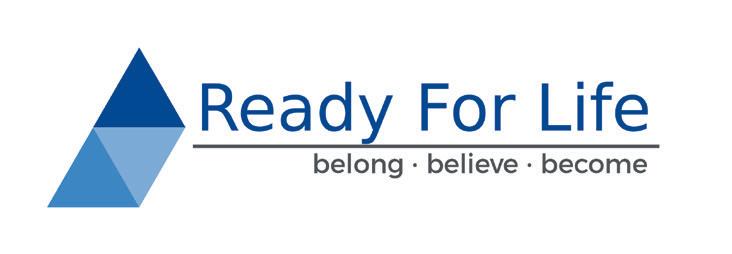
greater products . greater purpose Every
POSSiBiLiTEEs is more than a business; it’s a mission. A place where individuals with special needs don’t just work—they thrive. Where they gain confidence, find purpose, and spread joy to everyone they meet. Every shirt we print is more than fabric—it’s a symbol of inclusion, ability, and the belief that everyone deserves a chance to shine.
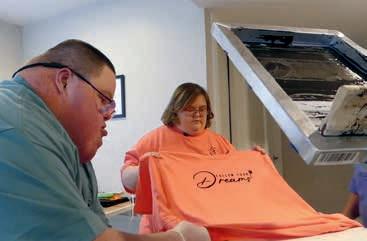

Wear what you believe in. Support inclusion, empowerment, and creativity with every purchase.
possibilitees.shop
@possibiliteesprinters
@possibiliteesscreenprinters

Ready For Life partners with Hope College, Ferris State University, and Northwestern Michigan College to offer immersive, inclusive post-secondary experiences for individuals with cognitive, developmental, and social disabilities. Our programs empower students to grow personally, build meaningful relationships, and pursue fulfilling, independent lives. Unlock Potential. Empower Futures.
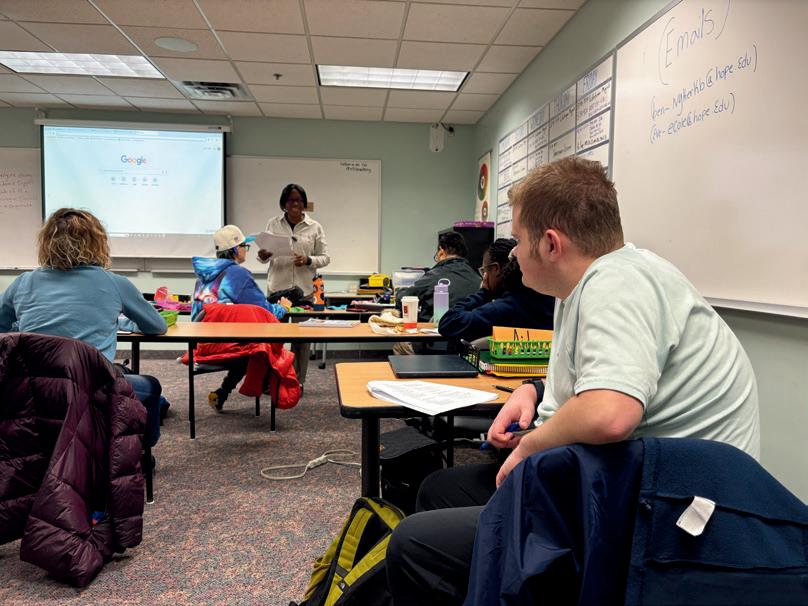
Register for an upcoming visit day by visiting our website: www.rflnetwork.org
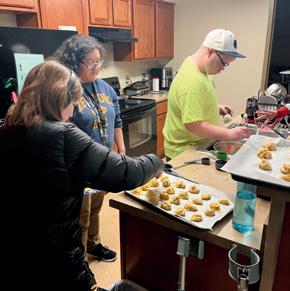




Each October, we proudly recognize National Disability Employment Awareness Month (NDEAM), a time to celebrate the many contributions of workers with disabilities and highlight the importance of inclusive employment practices. At Services To Enhance Potential (STEP), this is more than a month of awareness, it’s the mission we live every day.
Employment Changes Lives: A job provides more than a paycheck, it brings independence, confidence, and a sense of belonging. Yet people with disabilities continue to face barriers to employment. STEP is committed to breaking down those barriers by connecting individuals to Competitive Integrated Employment (CIE), where they work alongside their peers, earn fair wages, and demonstrate their unique skills.
Building Partnerships: STEP is grateful for the many businesses that open their doors to inclusive hiring. Through partnerships in industries such as retail, automotive, hospitality, medical, and manufacturing, our members gain real-world experience while employers gain dedicated, reliable team members. These collaborations create stronger workplaces and stronger communities.
Join Us in Celebrating NDEAM: As we mark the 80th anniversary of National Disability Employment Awareness Month, we invite our community to support workplace inclusion. Whether through hiring, volunteering, or spreading awareness, your support helps ensure that individuals with disabilities have the same opportunities as everyone else.
At STEP, we believe in the potential of every individual, and we are committed to making sure their contributions are recognized…not just in October, but all year long. To learn more about our programs or to partner with us, visit www.stepcentral.org.


“GAME

C. J. Butts was diagnosed with cerebral palsy caused by congenital cytomegalovirus (CMV) infection at Bon Secours Hospital in Grosse Pointe, Michigan. CMV is a common virus, like a cold, but if a person that has never been exposed to it comes in contact with someone who is a carrier, it cold possibly cause the fetus issues. Medical professionals recognized early signs of neurological impairment and referred him to St. John’s Hospital in Detroit. There, doctors discovered an excess of cerebrospinal fluid in his brain and surgically implanted a ventriculoperitoneal (VP) shunt to relieve pressure. The buildup of fluid had led to three significant complications: cerebral palsy, epilepsy, and impaired vision. This diagnosis emerged through clinical observation, neurological imaging, and professional evaluation testament to attentive healthcare and timely intervention.
From infancy, C. J. displayed several indicators that prompted these evaluations. Medical staff observed abnormal motor tone and developmental delays. Neuroimaging revealed hydrocephalus—an accumulation of fluid in the brain cavities—which necessitated surgical intervention. Once the shunt was in place, the extent of his impairments became clearer: disrupted motor control typical of cerebral palsy, recurrent seizures characteristic of epilepsy, and poor vision. These complications were interconnected, each contributing to the complexity of his condition.
C. J.’s parents, Margaret Mary Butts (age 66) and Christopher Michael Butts (age 67), along with his older brother, Zachary Taylor Butts (age 31), became integral members of his care network. The Butts family has resided in Michigan their entire life. From C.J.’s earliest days, Margaret and Christopher instinctually advocated specialized care, therapies, and support systems. Zachary provided sibling companionship, encouragement, and motivation, helping shape C. J.’s confidence and identity.
The impact of cerebral palsy, epilepsy, and poor vision on C. J.’s life has been profound—and yet transformative. Mobility was a major challenge: he could not walk until ages three to four. This delay weighed heavily on both him and his family, as each subsequent rehab milestone demanded patience, perseverance, and carefully structured therapy sessions. With time, effort, and support, he took his first steps, marking a triumphant moment that redefined hope and possibility for all involved.
Another considerable struggle involved seizure management. For years, unpredictably timed seizures— often concentrated around holidays—disrupted routines and created emotional strain. Only with the introduction of
new medication did seizure frequency and severity become more controllable. Vision impairments also required adaptations: specialized seating, large-print materials, and assistive technologies became essential tools in school and daily life.
Despite these obstacles, C. J. has built a life of determination, creativity, and community involvement. He is currently enrolled at Macomb Community College, pursuing an associate degree in communications and writing. Academic life presents its own hurdles, balancing coursework while managing visual limitations and potential health fluctuations requires flexibility and strategy. To succeed, he utilizes campus accommodations, assistive devices, and unwavering organization. His passion for writing, supported by family encouragement and personal interest, keeps him motivated toward graduation.
Throughout his journey, there have been defining moments and memorable achievements. Perhaps the most exhilarating came at the Special Olympics State Soccer Tournament. Though C. J. typically plays defense, in one game his coach placed him at forward—a role he seized with elation. He scored not once but twice, a milestone moment crowned by a spontaneous media interview. The thrill of those goals and the recognition that followed gave him a powerful sense of belonging and capability.
Over 14 years with the Special Olympics, C. J.’s role has evolved significantly. For the first decade, he was a dedicated athlete. In recent years, however, he has embraced leadership






responsibilities—serving as a health messenger and athlete leader. In these roles, he educates peers on healthy living, promotes awareness, and offers guidance based on his personal experiences. His commitment to community and personal growth deepened further when he became a volunteer lector at his church, reading scripture each Sunday.
Recreation and everyday joys remain essential to his identity. C. J. bowls in two leagues during fall and winter, plays in a summer baseball league, and competes in the Special Olympics bocce events. He rides a recumbent bike specially tailored to his physical needs, relishing each outing. His passion for game shows, especially Jeopardy! inspired him to launch a Facebook page where he crafts short stories and informational pieces, as merging his love of words with digital creativity.
Multiple organizations have supported C. J. and his family throughout his life. ARC of Macomb offered vital early developmental services and community connection during early childhood. Michigan Rehabilitation Services helped him earn and sustain his first job and develop professional skills. Allways Care/Bridges currently provides job placement support and individualized coaching once a person is employed. United Cerebral Palsy (UCP) was a cornerstone resource throughout

his younger years, guiding his family and offering access to services, respite, and emotional reinforcement.
Looking ahead, C. J. anticipates completing his associate degree in communications/writing; a milestone that brings the possibility of impactful storytelling, education, or advocacy. He eagerly awaits annual community events like Night to Shine, a special-needs prom celebrated every Valentine’s season, which he has attended for six transformative years. He also looks forward to participating in Dreams Come True on Woodward; an event he hopes will further enrich his personal aspirations and community connections.
C. J. offers advice grounded in his own journey. His central message: never give up. With faith, hope, help, and perseverance, individuals with disabilities can achieve remarkable goals. He emphasizes that a diagnosis is not a life sentence: cerebral palsy and epilepsy may shape the path, but they do not define potential. He encourages families to be proactive—to explore resources, to seek support from local and statewide organizations, and to advocate for their loved ones’ education, health, and community inclusion.
If explaining this diagnosis to families unfamiliar with it, C. J. would highlight that cerebral palsy arises


from brain injury or abnormal development—often triggered in his case by cytomegalovirus infection and consequent hydrocephalus. He would outline how diagnosis is typically confirmed: through neurological exams, imaging studies, and developmental assessments. He would stress the importance of early professional involvement—therapists, specialists, educators—and the availability of interventions, from physical therapy to mobility aids and medication. His explanation would emphasize practical strategies and hope: that supportive resources and community connections make a measurable difference in quality of life.
To someone new in the community, C. J., he would share that although the resources may not always be immediately visible, they are readily available—with some persistence. He would remind newcomers not to become discouraged by initial setbacks; rather, to ask questions, connect with organizations, and lean on local networks. He knows firsthand that community support fosters independence and belonging.
Beyond his accomplishments and involvement, several personal details define C. J. today. He is a devoted Catholic, proudly serving as lector and participating actively in his parish community. He is a member of the Knights of Columbus, finding fellowship and opportunities to serve others. Writing remains a deep passion, and he continues to share his voice through his Facebook page. His love for game shows— particularly Jeopardy, which he enjoys spirited competition with his dad! —reflects a lively curiosity and joy in learning.
C.J.’s life story is not simply a narrative of disability—it is a testament to resilience, purpose, and progress. A diagnosis



of cerebral palsy, epilepsy, and visual impairment once posed daunting challenges, but with early medical intervention, family support, community services, and personal conviction, he has forged a path defined by growth and leadership. Each milestone—walking, graduating, scoring goals, writing, serving—represents more than personal triumph: it reflects the power of perseverance, hope, and community.
Margaret and Christopher embodied unwavering parental advocacy from his earliest years. They navigated hospitals, therapies, and learning systems to find the best supports. Zachary, as older brother, contributed encouragement and connection, helping shape C. J.’s confidence. Together, their family created an environment where faith, love, and belief sustained daily life and opened possibilities.
In school, C. J. faced academic challenges—balancing physical limitations and visual impairment—but he tackled these through organization, assistive aids, and institutional supports. His decision to pursue higher education is driven by a desire to merge his communication skills with his own experience—hoping one day to write pieces that inform, encourage, and reflect lived resilience.
Athletics have been both outlet and achievement. Special Olympics soccer, bocce, softball, and bowling have offered not just competition, but community, coaching, and leadership. The moment he scored twice as forward stands out as a turning point: not only for the joy of accomplishment, but for the message it sends—that capability exists beyond expected roles.
Service remains central. Whether serving as lector during Mass or empowering peers through health messaging, C. J. consistently lifts others. His faith communities and special-needs networks provide spaces of belonging, but he reciprocates through active engagement and shared purpose.
Behind each story—each goal, each class, each volunteer session, each writing post—lies a commitment to possibility.
C. J. models a vision of life defined not by limitation, but by determination, faith, and creativity. His story continues to unfold in writing, athletics, service, and study—and stands as an example for individuals and families facing similar journeys.
C. J. shares his story with gratitude, humility, and hope. He is committed to showing that with support, belief, and perseverance, life with disability can also be full of meaningful achievements and joy. Through his own growth and outreach, he invites others to embrace challenges, seek connection, and believe in possibilities yet to come.
BY MARIA GIANCOTTI, M.ED. - STUDENT ADVOCACY MICHIGAN

When your child has an IEP, it’s natural to feel both relief and worry: relief that there is a plan in place, and worry about whether the school will actually follow through. The truth is, writing the IEP is only the beginning. The real work happens throughout the school year as the plan is carried out. That’s why ongoing monitoring is so important. Parents play a key role in ensuring their child is making progress and receiving the services and supports promised.
The Individuals with Disabilities Education Act (IDEA) guarantees your child a Free Appropriate Public Education (FAPE). But IDEA also makes it clear that IEPs are more than just words on paper—they are legal commitments. If services aren’t provided, or if your child is not making measurable progress, your child’s rights may be at risk. Regular monitoring helps catch problems early, before they grow into bigger setbacks.
PROGRESS REPORTS: WHAT THE LAW REQUIRES
Under IDEA, schools are required to inform parents of their child’s progress toward IEP goals at least as often as general education students receive report cards. These progress reports must include more than just a checkmark or vague comment—they should provide measurable data about whether your child is on track to meet their annual goals. For example, instead of saying “making progress,” a report should include something like:
• “John can now solve two-digit addition problems with 80% accuracy across three trials.”
If progress reports are unclear or inconsistent, you have the right to request clarification and supporting data.
So how can you stay on top of your child’s IEP without feeling like you need a law degree or a teaching license? Here are some practical strategies:
1. Create a Binder or Digital Folder: Keep copies of the IEP, progress reports, report cards, emails with teachers, and any work samples you receive. Having everything organized makes it easier to spot patterns.
2. Review Progress Reports Carefully: Compare the data provided with the specific goals written in the IEP. Ask yourself:
• Is the school reporting in measurable terms (percentages, scores, frequency)?
• Does the report show growth over time?
• Is my child on track to meet the goal by the end of the IEP year?
Don’t wait for the next IEP meeting. Reach out to teachers or service providers if something seems off. A quick email asking, “Can you share an example of how my child is working on this goal in class?” can give you valuable insight.
Teachers and staff should be collecting data on your child’s IEP goals. You have the right to ask for that raw data. Seeing the numbers can help you understand your child’s progress more clearly than general comments.
• Progress reports always say “making progress” but never show measurable growth.
• Services listed in the IEP (like speech therapy or occupational therapy) aren’t mentioned in updates.
• Your child’s classroom performance or grades don’t line up with the reported progress.
If you notice these issues, request a meeting to discuss your concerns.
1. Request an IEP Meeting if Needed
You don’t have to wait until the annual review. IDEA allows parents to request an IEP meeting at any time. If your child isn’t making expected progress, this may be the moment to adjust goals, teaching strategies, or supports.
It can feel intimidating to monitor the IEP closely but think of it as teamwork. Most teachers want your child to succeed, and by asking questions and requesting updates, you’re showing that you’re an engaged partner. A respectful but persistent approach keeps everyone accountable.
An IEP isn’t meant to sit in a drawer until the next annual meeting. It’s a living document, and monitoring it throughout the year ensures your child receives the support they need to thrive. By staying informed, reviewing progress reports, and speaking up when something doesn’t look right, you help make sure the school not only writes the plan but follows it.
Your advocacy can make the difference between minimal growth and meaningful progress—and that’s exactly what the law, and your child, deserve. If you need help navigating your child’s IEP, contact us at 248-372-9770.
AS A CARE PROVIDER, Judson Center meets families every week who are searching for clear, reliable information about autism. Misinformation spreads quickly, and it can cause fear or delay in seeking supports that improve lives. Below we unpack several common myths and offer evidence-based facts to help caregivers, educators, and community members better understand autism.
Myth 1: Vaccines cause autism.
Fact: Extensive scientific research finds no causal link between vaccines and autism. Large cohort and case-control studies, and a robust 2014 meta-analysis that pooled data from over one million children, found no association between childhood vaccinations, including the MMR vaccine, and the development of autism spectrum disorder. Major public health bodies continue to affirm vaccine safety, and avoiding vaccination puts children at risk for serious infectious diseases. (Taylor, Swerdfeger, & Eslick, 2014; CDC, 2025).

Myth 2: All autistic people lack empathy, or they don’t want friendships.

Fact: Many autistic people feel deeply and want social connection, but they may express emotions differently, or find typical social cues confusing. What looks like lack of empathy can sometimes be sensory overload, difficulty with nonverbal communication, or challenges in perspective-taking that are part of the autism profile. Encouraging relationships, teaching social skills, and providing sensory-aware environments can make a big difference. (Autism Speaks, n.d.).
Myth 3: Every autistic person is a “savant,” or has geniuslevel abilities.
Fact: While some autistic people have exceptional skills or intense special interests, the “Rain Man” stereotype is rare and unhelpful. Autism presents across a broad spectrum of strengths and challenges, from people requiring substantial support to those who live independently with few supports. Recognize the person first, rather than chasing stereotypes. (Ambitious About Autism, 2024).
Myth 4: Autism only affects boys.
Fact: Autism occurs across all genders. Historically, diagnostic criteria and social expectations meant many girls and women were underdiagnosed, because some present differently or learn to mask differences. Becoming more gender-aware in screening and assessment improves identification and access to supports for everyone. (National Autistic Society, n.d.).
Myth 5: “Everyone is a little autistic,” so autism is not a real condition.
Fact: While many people may relate to individual traits common in autism, clinical autism is a distinct neurodevelopmental condition characterized by persistent differences in social communication and restricted or repetitive behaviors that affect daily functioning. Minimizing autism as a casual descriptor


can be invalidating to autistic individuals and families seeking support. (Ambitious About Autism, 2024). Practical guidance for families and community partners
1. If you have questions or concerns about a child’s development, seek screening early. Early evaluation leads to earlier supports, which often improve outcomes. The CDC and local providers can point you to validated screening tools and referral pathways. (CDC, 2025).
2. Use reputable sources, and ask your child’s pediatrician or your Judson Center care team when you see claims online that sound alarming. Scientific consensus evolves, but today’s largescale evidence supports vaccines and promotes neurodiversityaffirming care. (Taylor et al., 2014; Autism Speaks, n.d.).
3. Focus on supports that improve daily life, such as speech therapy, behavioral interventions, schoolbased accommodations, and sensory strategies, tailored to the child’s needs and family goals.
Dispelling myths is not about shutting down questions, it’s about replacing fear with facts, and stigma with supports. At
Judson Center we aim to partner with families, offering clear information and compassionate services so that autistic people can thrive in school, work, and community life.
References
1. Taylor, L. E., Swerdfeger, A. L., & Eslick, G. D. (2014). Vaccines are not associated with autism: An evidence-based metaanalysis of case-control and cohort studies. Vaccine, 32(29), 3623–3629. https://doi.org/10.1016/j.vaccine.2014.04.085
2. Autism Speaks. (n.d.). Do vaccines cause autism? https:// www.autismspeaks.org/do-vaccines-cause-autism
3. Ambitious About Autism. (2024). Autism myths and facts. https://www.ambitiousaboutautism.org.uk/ what-we-do/awareness/autism-myths-and-facts
4. National Autistic Society. (n.d.). What is autism? https:// www.autism.org.uk/advice-and-guidance/what-is-autism
5. Centers for Disease Control and Prevention. (2025). Autism spectrum disorder (ASD). https:// www.cdc.gov/autism/index.html
YOU’RE INVITED!

DATE: Saturday, October 11, 2025
TIME: 11:00 AM – 1:00 PM
LOCATION: Sterling Heights Public Library, 40255 Dodge Park Rd, Sterling Heights, MI 48313
Join us for a heartwarming and inclusive event for families and individuals in the special needs & disability community!
EVENT HIGHLIGHTS:
• Sensory-Friendly Story Time | 11:00 AM – 11:30 AM
• Explore Resources & Support Partners for your family’s journey
• Engaging Sensory Activities for all ages and abilities
• Discover Unique Library Programs including Braille books & adaptive resources
• Experience KultureCity’s Mobile Sensory Stations, creating inclusive spaces for individuals with invisible disabilities.
• Connect with Other Families, Caregivers, and Individuals in the community
Come for story time or stay for the full experience. Whether you’re just getting started or well on your journey, this is a safe, welcoming space to explore, connect, and be celebrated.
LINK TO REGISTER: https://buytickets.at/uniquelyyou/1787843
All are welcome. We can’t wait to see you there!
QUESTIONS? CONTACT US AT: Jamie.Olson@n2co.com 248-882-8448





McKinlee is a sweet, outgoing 6-year-old that loves music, dancing, and has an obsession with Minnie Mouse. She has changed our lives for the better and she has taught us more than we could ever teach her. She has a heart of gold and loves everyone.

Megan has worked at Culvers for almost 10 years. She’s very independent and knows her job.
We celebrated not only the 4th of July in this photo, but the lack of fear fireworks and sparklers use to create.


Amelia shows us pure love. She shows us that it’s important to enjoy every moment even if it’s just playing in the grass. Amelia is truly our angel baby.
Never underestimate what we can do with our extra chromosomes! Give me a chance to show you what I am capable of doing. It may take me longer but don’t discount my abilities.

Our sweet girl’s light shines so bright. She is a joy to all who know her. Down syndrome isn’t going to stop her from being who God creatures her to be.


Is a super climber, he loves watching cocomelon and ms rachel. Hes always smiling and waving to everyone he sees. Alejandro is full of adventure and has no fear. He loves the water so much you would think he was part fish.
PHOTO BY SMILESBYKK
Scarlett is a free spirit. We had a mommy and me photo shoot and while I was stressing about Scarlett not wanting to follow directions or wear her shoes, she enjoyed dancing barefoot and smiling, and playing with all the props and it turned out to be a beautiful photo shoot. She reminds us of every day to appreciate the little things.

Dr. Jamie McClintic is a pediatric occupational therapist always looking for inclusive opportunities to support her patients! Her incredible daughter happens to have Down syndrome, and the pair has published a self-help book titled, “Grieving the Gift!” The harder you hit, the higher you bounce. Leave today a better place than how you found it. We all have abilities that can change the world.

CHRISTOPHER
BARKSDALE
He has just finished therapy for a totally new reconstruction. He received this t-shirt as a therapy graduate.

RILEY
Riley has Sotos Syndrome and mild cerebral palsy. We never thought he’d be able to ride a bike with a regular seat, but he proves us wrong every time. Here’s Riley showing off his new skills at his school’s Special Athletes Day.
BY JOCELYN COOK
Halloween is usually a favorite holiday for kids, but for a child with autism, Halloween holds the potential for anxiety and irritation. Everything is “out of the norm,” and most kids with autism thrive on routine. Our team here at Healing Haven incorporates the holiday into our therapy to help our kids learn to enjoy Halloween. So, we’ve compiled some tips for families navigating Halloween and autism to help you and your child have a wonderful, and not frightful, holiday.
1. Make the Unknown Known
Talk to your child about Halloween for a few weeks ahead of time so when the day comes it’s not a surprise. Show pictures of kids in costumes, download social stories about Halloween, play videos of children trick-or-treating, etc. If you create a social story and have pictures of your kid(s) from past years, that can help to remind them of what this holiday is about.
2. Practice Wearing Costumes
By having a “dress rehearsal” you can help your child adjust to the uniqueness of wearing a costume. For children with severe sensory issues, try making something homemade out of their clothes. Additionally, light-up shoes or accessories can be helpful to keep track of your child in the dark.But remind yourself that, in the end, it’s okay if your child just refuses to wear a costume at all. Get them a Halloween T-shirt and call it good.
3. Do a Neighborhood Walk-Through
During Halloween time, we’ve all seen houses that have intense decorations. A walk through your neighborhood – or the area you plan to trick-or-treat – at night can be helpful to plan for any houses you might want to avoid that your child may find scary.


4. Practice Trick-or-Treating
Teaching your child with autism about the rules of trick-ortreating is an important part of Halloween prep. By going through the steps of how trick-or-treating works, you will help them feel more comfortable and confident.Be specific when you practice the steps: knock on the door, say “trick-or-treat,” say “thank you.” Also, train them to not go inside the house, but go to the next house. And if your child uses an AAC device, make sure these phrases are loaded and they know where to find them.
5. What To Do With All That Candy?
Creating a plan for handling the trick-or-treat haul your child brings home is wise, and if they have allergies or a restricted diet, it’s absolutely necessary. If you haven’t already heard of the Teal Pumpkin Project, it’s a great way to support those with food allergies. Also, talking about the issues with Halloween candy and allergies with your child can help prepare them for some items not being safe for them.
6. Be Flexible
It’s important to remember that Halloween is supposed to be fun. So, if your child is overwhelmed by all the elements of trick-or-treating, don’t force them to go. They could help pass out candy or invite a few friends over who may feel the same way. Also look for alternate Halloween activities in your area.
We hope these tips are helpful and reduce some of the anxiety either you, or your child, may be feeling about Halloween!
To learn more about the comprehensive autism services at Healing Haven, visit thehealinghaven.net



BY DORENE J. PHILPOT, ATTORNEY AT LAW

DORENE PHILPOT is a private practice attorney licensed in Michigan, Indiana and Texas. She devotes her 25-year+ practice entirely to representing special needs children and their parents under the Individuals with Disabilities Education Improvement Act. She is the recipient of a national award for her advocacy work for students, i.e. the 2012 Diane Lipton Award for Outstanding Educational Advocacy from COPAA (Council of Parent Attorneys and Advocates).
She is the author of “Do-It-Yourself Special Education Due Process: An Educational Guide” which is available at www.learningenabledpublications.com.
She is a member of Mensa. She gives presentations to parent groups and other organizations on a regular basis about special education law rights of children. Before becoming a lawyer, Dorene was a journalist for 13 years, most recently serving as an editor at The Indianapolis Star and Indianapolis News. Before that, she worked as an editor at other newspapers and magazines, including The Saturday Evening Post.
AS AN ATTORNEY who has represented families in special education matters for more than 25 years, I assert that including robust goals and objectives in your child’s Individualized Education Plan (IEP) is the single most important step in having an IEP that will best serve your child’s needs now and in the future.
The “IDEA requires an IEP to confer a meaningful educational benefit gauged in relation to the potential of the child at issue... the intent of Congress appears to have been to require a program providing a meaningful educational benefit towards the goal of self-sufficiency, especially where
self-sufficiency is a realistic goal for a particular child.” Deal v. Hamilton Department of Education, 392 F.3d 840, 862, 864 (6th Cir. 2004)
The Supreme Court has called the IEP “the centerpiece of the statute’s education delivery system for disabled children.” Endrew F v. Douglas Cnty. Sch. Dist. RE-1, 580 U.S. 386, 390-91 (2017) [1]
And the centerpiece of the IEP is the section that contains the child’s goals and objectives.
First, let’s look at what are the required elements of goals and objectives: 1. They must contain “present levels.” This means they must state the level at




which the child is currently performing on a particular skill.[2] Why do we need to know what the current skill level is? Because without knowing that, we won’t know later whether the child has regressed, remained at the same level on skill, or made progress on that skill. It’s analogous to joining Weight Watchers, where you are asked to weigh in when you start and at intervals going forward. If you didn’t, how do you really know where you started or how much weight you had lost? Present levels can be ascertained via formal and informal evaluations, observations, and trials as to the skills in question.
They must state annual and shortterm expectations: They must cite what the expectation is in terms of progress expected to be made on a yearly basis and at intervals throughout the school year. The child will need a specific, articulated goal to shoot for. What specific skill do we want the child to be able to perform after working on the goal and/or objective for the stated amount of time?
They must be measurable [3] It must be articulated in a manner that makes it possible for us to measure if the child has lost ground on the skill, stayed the same, or advanced in the skill in question. In order to know the answer to this, we need to be able to challenge the student on the skill and see how he performs on it. This tells us the answer to whether he has made progress or not. For example, “Johnny will read better” doesn’t really tell us what specifically we are working toward or how we will know when the goal has been achieved. One test for deciding whether an IEP goal is objective and measurable is that a well-written goal should pass the “stranger test,” i.e. a person unfamiliar with the IEP could implement the goal and implement the assessment of the student’s progress on the goal.[4]
They must be written in all areas of need and deficit. If the child has dyslexia or another specific learning disability in reading, a parent should expect to see goals and objectives that work on teaching the child the skills associated with learning to read or learning to be a better reader. If the dyslexic child has no reading goals, but instead
has goals and objectives that pertain to other areas, such as organizational skills, the IEP needs to be revised to include specific goals and objectives in reading (plus any other areas of need). How do we decide what all the areas of need are? Sources of information about the child’s deficit areas can be gleaned from the child’s evaluations, prior IEPs, notes sent home from the classroom teacher, emails from school staff, discipline referrals, and things the parents have noticed at home and in the community. Sometimes, students have a personal services plan in the IEP, but almost never are there goals and objectives written to address the specific deficit areas listed in the personal services plan part of the IEP. If the child needs personal services, then all of those deficit areas listed, of course, need to be worked on at school through the child’s IEP. When I say all areas of deficit, I really mean all areas of deficit. Good goals and objectives are not just for academics. If your child is not toileting appropriately, there needs to be goals and objectives in the IEP to teach your child how to toilet appropriately, for example. If your child has trouble remembering to turn in completed work, that skill needs to be worked on with goals and objectives.[5] Skills that the child hasn’t picked up on his or her own need to be directly taught through goals and objectives.
5. They must be written before the rest of the IEP. In a well-written IEP, the goals and objectives are written
FIRST. Why? This is because the rest of the child’s IEP should be built around these appropriate goals and objectives. For example, no decisions about the rest of the child’s services can properly be made without first establishing what, exactly, we are working toward in the goals and objectives.
Likewise, no decisions about placement can be properly made without first establishing what, exactly, we are working toward in the goals and objectives. The goals and objectives are devised, and then the team asks, “Now that we have decided what we’re going to be working on, what is the Least Restrictive Environment in which these goals and objectives can be worked on?”
So, if your school district is in your IEP team meeting and trying to decide what services will be in the IEP, or what placement your child will be in, prior to writing the goals and objectives, they are doing it backwards.
My child mastered a goal: Now what? What happens once a child masters a goal in an IEP? The IEP team should reconvene and write another goal for the child to work on. You do not have to wait until the annual IEP team meeting to do this. New IEPs can be written several times during the school year, and they should be if the child is mastering goals. That is great news. Now let’s work on some other goals to help the child perform at the same level as peers, or as closely as the child possibly can.

My child has not made progress on the goal: Now what?
Perhaps the goal was poorly written, or maybe something in the way the goals and objectives are being delivered needs to be adjusted. Do the staff working with your child fully understand how to implement the goals and measure progress? Are the services intensive enough? Do staff members need additional in-service training to better understand the services or your child’s needs? These are the kinds of questions that should be discussed in the IEP team meeting to identify what is happening and determine how to address it.
Keep in mind that the express purpose of federal education law is “to ensure that all children with disabilities have available to them a free appropriate public education that emphasizes special education and related services designed to meet their unique needs and prepare them for further education, employment and independent living.”
20 U.S.C. § 1400(d)(1)(A). You may need to remind your IEP team of this from time to time.
Do everything you can to make sure your child’s IEP goals and objectives are written with that purpose in mind. They should prepare your child for further education, employment and independent living. Your child deserves the opportunity not only to work toward those outcomes but also to achieve them.
[1] The IEP is a written plan, which must include “a statement (1) of the present levels of educational performance of the child, (2) of the annual goals, including short-term instructional objectives, (3) specific educational services to be provided, (4) projected date for initiation and anticipated duration of services, and (5) evaluation procedures. Buser ex rel. Buser v. Corpus Christi Indep. Sch., 51 F.3d 490, 493 (5th Cir. 1995) (citing 20 U.S.C. § 1401(a)(20)).
[2] Goals and objectives must be based on present levels of performance and must state annual and short-term expectations. 34 C.F.R. §300.320.
[3] 34 C.F.R. §300.320.
[4] Mason City Cmty. Sch. Dist., 46 IDELR 148 (SEA IA 2006).
[5] Educational performance is not limited to academics, but also encompasses behavioral and social skills progress, for example. Venus Indep. Sch. Dist. v. Daniel S., 2002 U.S. Dist. LEXIS 624 (N.D. Tex. 2002). “Behavioral modifications, for instance, immediately come to mind as an example of an IEP strategy that may remediate a disability while also being necessary to confer educational benefits.” Klein Indep. Sch. Dist. v. Hovem, 690 F. 3d 390 (5th Cir. 2012.)

Ellie Haycock Is Totally Normal by Gretchen Schreiber is just my kind of book: the main character(s) have some sort of medical condition/ chronic illness/ disability and yet it touches on everyday stuff like friendship, love, self esteem, family dynamics etc. In Ellie Haycock is Totally Normal we meet Ellie, a high schooler with a rare genetic condition that affects both her physical appearance and her internal organs. Her mom runs a blog that has chronicled Ellie’s life from the very beginning. It serves as a way for her to connect with others and raise money to support and raise awareness about the things families experience when raising a child with a disability. This is a huge source of frustration and hurt for Ellie though (more on that later). The reader quickly learns that Ellie is experiencing persistent breathing issues that her local doctor can’t figure out. Therefore she and her mom are going to see a specialist and stay at “The Home” (essentially a Ronald McDonald House) for a bit. The reader also learns that Ellie is very deliberate in keeping her “hospital life” and “life-life” separate. She has hospital friends and nonhospital friends and they don’t know anything about each other.
The majority of the book features her hospital best friend Caitlin as well as a few other teens with varying medical conditions staying at “The Home”. Each teen has their own way of looking at/ dealing with their situation and it’s interesting to notice the differences. In particular, Ryan is a newbie to the whole hospital life thing and has total faith that his doctors will figure out what’s causing his mysterious symptoms. This is the complete opposite of Ellie’s perspective.

She knows all too well that doctors don’t know everything and especially doesn’t trust her newest specialist. She is also used to her mom
running the show when it comes to talking to the doctors and making decisions for her (again, chronicling everything on the blog). Undeterred by Ellie’s negative attitude towards the healthcare system, Ryan offers to be her “Medical coach” and a friendship is formed. He encourages her to be more involved when talking with the specialist about the plan he’s suggesting. But, the coaching thing isn’t one sided: Ryan soon realizes that Ellie can provide insight into what it’s like being a professional patient.
As Ellie and Ryan’s friendship deepens she wonders whether keeping her two lives separate is best after all. To complicate things, Caitlin is generally very open about her own feelings and experiences by maintaining a social media presence of her own. All of this leads to friction within the friend group and a lot of self reflection on Ellie’s part.
Going back to the Mom’s blog: throughout the book we see examples of the posts and get a glimpse into her perspective of a mom on a mission to find answers but also come to terms with the social emotional side of raising a child with health issues.
I really like that the author was deliberate in making this a medicalfocused story with typical teen issues thrown in. As she mentions in the beginning, finding books like this is rare. While reading this one, I’ll admit I had difficulty relating to Ellie because of how strongly she felt about not sharing her medical side with her non-hospital friends. I don’t have that “luxury”- I’m much more like Caitlin’s character in that respect. But, I can empathize with Ellie and understand why she feels
the way she does especially given the fact that she feels like the whole world knows everything about her because of the Mom’s blog. When I was born, the internet wasn’t really a thing. Therefore my mom didn’t have the opportunity to blog and share our experience via social media like many parents do today. If she did, maybe I’d feel more like Ellie who simply wants to be able to control the narrative of her life.
Like I said earlier, the book explores your typical teen issues of friendships, relationships, and growing up but it also highlights other non-typical stuff:
Learning how to be an involved member of your medical team
The balancing act of knowing what, when, and how much to share online
The affect that how a parent views their child’s condition impacts their child’s perception of themselves and the world
The toll on parents and some of the hard choices they must make when raising a child like Ellie
All in all, I think this is a very good glimpse into this often hidden world. While similar to The Fault in Our Stars (one of my top favorites) or Five Feet Apart, this book honestly goes deeper. I think it’s a realistic illustration of what it’s like being a teen like Ellie and navigating the road to adulthood. Perhaps this next point is going a little to the extreme but I also think it serves as a warning for parents nowadays about the impact of “oversharing” your child’s story online. Eventually that child is going to grow up and may or may not want certain details online. They may choose to keep things private or they may become the next big social media influencer. The key is they have a choice. Therefore, I could see this as being a great option for both teens and parents to read and then discuss together. Next month’s pick is The Accidental Caregiver by Kimberly Fraser

IN THE HEART OF DETROIT , there’s a place where hope is not just offered but lived out every single day—a place where families of individuals with Down syndrome find unwavering support, joy-filled learning opportunities, and a community that celebrates every milestone. This place is GiGi’s Playhouse Detroit, one of more than 62 brick-andmortar Down Syndrome Achievement Centers across the United States and Mexico. It stands as part of the only international network of its kind, committed to changing the way the world views Down syndrome while sending a global message of acceptance for all.
The mission of GiGi’s Playhouse is both simple and profound: to make a lifetime commitment to changing lives and providing hope through the


consistent delivery of free educational, therapeutic, and career development programs for individuals with Down syndrome, their families, and the surrounding community. These programs are built on a replicable playhouse model that ensures quality, purpose, and impact in every location. Their vision is to see a world where individuals with Down syndrome are not only accepted but embraced—in their families, schools, and communities.
At the very core of this mission lies a promise: a lifetime commitment to families. That promise means being present for families from the moment of a prenatal diagnosis, walking alongside them during early childhood, supporting them through school years, and guiding them into adulthood and career development. This is not a short-term program—it’s a relationship that lasts for life.
Down syndrome is the largest chromosomal disability in the United States, yet it remains the least funded. GiGi’s Playhouse fills this gap by providing over 30,000 individuals with Down syndrome each year the tools and opportunities they need to succeed— at no cost to them or their families. From the earliest days after a diagnosis to job skills training in adulthood, the Playhouse ensures that no family has to walk their journey alone.
The heart of the movement began in the summer of 2002, when founder Nancy Gianni welcomed her beautiful daughter GiGi into the world. It didn’t take long for Nancy to see that her daughter could do all the same things her other children could do. She also saw a world that wasn’t ready to believe that.
Determined to change perceptions and maximize her daughter’s potential, Nancy envisioned a place where families could celebrate their children’s abilities while benefiting from purposeful, joyfilled programs. The very first GiGi’s Playhouse was born from that vision—a place to inspire, to empower, and to prepare the world for GiGi, and for every child like her.
Today, GiGi’s Playhouse Detroit carries forward that founding spirit. Every program offered is designed to support the unique learning styles of individuals with Down syndrome, who are often “visual learners” and benefit from multi-sensory approaches that combine movement, music, and structured routines. Whether it’s reading, math, social skills, speech and language, motor skills, or job readiness training, the Playhouse ensures that the learning is engaging, purposeful, and fun. Parents are encouraged to maintain high expectations for their children’s success—whether in academics, social environments, or future employment— because those expectations shape what children believe they can achieve.
The environment is also one of connection. Programs are not just for the child; they are for the family. Parents and caregivers share ideas, ask questions, and find encouragement from others walking a similar path. Siblings are welcomed and included, building healthy relationships and fostering understanding from a young age. This sense of community helps families move beyond the initial shock of a diagnosis and toward a life filled with celebration and opportunity.
One of the Playhouse’s cornerstone philosophies is called Best of All. It’s
not a competition, and it’s never about perfection. Best of All is a continual, measurable celebration of progress— standing one second longer, reading one more word, learning a new number, taking an extra step. It’s about being better than you were yesterday, no matter how small the step, and always celebrating that progress. This mindset fosters confidence and self-esteem, not just for the individual with Down syndrome, but for the entire family.
The impact of GiGi’s Playhouse extends far beyond the walls of the Detroit location. Through their Generation G campaign for global acceptance, they actively work to change societal perceptions and to showcase what individuals with Down syndrome are truly capable of—as students, co-workers, volunteers, and valued members of their communities. Acceptance, they believe, is not just a feeling; it’s an action. By showing the world the accomplishments of their participants, GiGi’s Playhouse is reshaping what inclusion looks like.
Running a Playhouse of this scope and heart requires many hands and open hearts. GiGi’s Playhouse Detroit is a volunteer-run organization, relying on the dedication, skill, and passion of individuals from all walks of life. Since the very first Playhouse opened in 2003, all programs have remained free for families—something only possible through the generosity of volunteers and donors.
There are many ways to serve. Program Leaders, often with

backgrounds in developmental therapy, occupational therapy, physical therapy, special education, music, or the arts, facilitate activities and connect deeply with families. Host Families attend sessions to make sure no parent walks through the door alone. Program Volunteers assist leaders, bringing energy and encouragement to every activity. Literacy and Math Tutors commit to helping participants develop critical skills, working directly with families to schedule sessions that fit their needs.
For those who prefer to support behind the scenes, opportunities include marketing, graphic design, blog writing, grant writing, event planning and more! Each role, whether on the front lines or behind the curtain, plays a vital part in ensuring programs remain vibrant, purposeful, and accessible to everyone who needs them.
GiGi’s Playhouse Detroit also hosts events that connect the community, celebrate achievements, and raise awareness. These gatherings serve as more than fundraisers—they are touchpoints for building relationships and reinforcing the Playhouse’s mission of acceptance and inclusion. Committee members, event chairpersons, and sponsorship coordinators work tirelessly to ensure these events are impactful and inspiring.
The challenges GiGi’s Playhouse helps families overcome are both practical and deeply personal. They address barriers to education by offering individualized learning support. They prepare participants for employment by building job skills and confidence. They promote community inclusion by creating spaces where differences are embraced and celebrated. They help families navigate the often-complex systems of support and services, and they combat stigma by shining a light on the talents and abilities of every participant.
Perhaps most importantly, they create a sense of belonging—a place where families know they are not alone, where they feel understood, and where their child’s potential is never underestimated. By empowering individuals to achieve their fullest potential, and by supporting caregivers in preventing burnout and maintaining

hope, GiGi’s Playhouse Detroit is changing lives every single day.
It’s a place where a toddler takes their first steps to cheers and applause.
It’s where a teen learns to read their first chapter book and beams with pride.
It’s where a young adult practices for a job interview, knowing they have something valuable to offer.
It’s where families walk through the door feeling unsure and walk out feeling seen, supported, and celebrated.
Every moment at GiGi’s Playhouse Detroit is a reminder that acceptance is powerful, progress is worth celebrating, and every person—regardless of diagnosis—has a place in the community.
For those who wish to be part of this mission, there is always room for one more. One more volunteer to guide a program. One more donor to make a class possible. One more voice to advocate for acceptance. One more person to join in the belief that individuals with Down syndrome deserve every opportunity to thrive.
Because at GiGi’s Playhouse Detroit, the work never stops, and neither does the love.
Follow their journey and join the movement toward acceptance for all: GiGi’s Playhouse Detroit detroit@gigisplayhouse.org Instagram: @gigisplayhousedetroit

Through Museums for All, those receiving food assistance (SNAP benefits) can gain free or reduced admission to more than 1,000 museums throughout the United States simply by presenting their EBT card and a photo ID. Check here for participating museums. https://museums4all.org/
Ella Sharp Museum Sensory Time
Every Saturday at 9:00 am
3225 4th Street, Jackson, Michigan 49203
During sensory-friendly-hours, the Ella Sharp Museum will open its galleries at 9 a.m., one hour before the museum opens to the public. Families with members who are neurodiverse, autistic or have other sensory processing disorders or cognitive disabilities, are welcome to visit for a quieter experience in a controlled environment. Designated quiet zones will allow visitors to decompress and explore the museum at their own pace.
Before each program, families can browse “pre-visit” materials to help prepare for their visit, including social narratives and maps of the facility. These materials are also available to assist families planning visits outside of program hours. A sensory backpack is available at the front desk for use.
To ensure the most sensory-friendly environment possible, capacity during these special hours will be limited to 50 people. More information is available at ellasharpmuseum.org/ classes-and-events/sensory-time/.
Impression 5
Oct. 12 from 9:30 am - 11:30 am and Oct.
29 from 5:30 pm - 7:30 pm
Impression 5 Science Center, 200 Museum Dr., Lansing, MI 48933
Explore the Science Center during Sensory Friendly Hours, with select exhibits modified to reduce sounds, scents and lighting stimuli. Guests can expect limited building capacity, pop-up activities, and a map indicating the sensory experiences in each exhibit.
• Thanks to MiABLE for supporting Sensory Friendly.
• Admission is regular price; free for members.
More information is available at impression5.org/sensoryfriendly.

BY CHRISTIA WOODFORD
Abrams Planetarium Sensory-Friendly Shows
Check website for available times in the Fall.
755 Science Road, East Lansing MI 48824
These shows will run with the lights up, the sound down and theater doors open so attendees can move around as needed. A “chill out” area is available in the lobby. All shows include a live star talk about what’s visible in the night sky. A short break will occur between the main show and the star talk. Information about what to expect will be provided when tickets are purchased.
• Cost: Adults, $5.50; students and senior citizens, $5; children 12 and under, $4.50.
• Friends of Abrams Planetarium members: free.
• Free with Museums for All (valid EBT, Medicaid or WIC card and photo ID required).
More information: abramsplanetarium.org/Programs/Sensory.html
Grand Rapids Children’s Museum
Sensory-Friendly Play
Nov. 3, 5:00 pm- 7:00 pm RSVP
Grand Rapids Children’s Museum, 11 Sheldon Ave. NE, Grand Rapids, Michigan 49503
Together with Autism Support of Kent County, Grand Rapids Children’s Museum welcomes families to play in a calmer, quieter environment outside regular museum hours. Registration is required.
• Check the calendar for specific sensoryfriendly event dates: grpm.org/visit
• More info: autismsupportofkentcounty.org/ new-products/p/2024-night-at-the-gr-childrens-museum.
Carhartt v Red Wing Alumni Hockey Game Fundraiser hosted by Easterseals/MORC
Oct.13
14900 Ford Rd, Dearborn, MI 48126
For more information https://morc.easterseals.com/take-action/ attend-an-event/carhartt-v-red-wing-alumni-hockey-game
TheraplayYoga: Therapeutic Playful Yoga for Diverse Abilities
Adaptive Yoga Studio, 2015 E. Michigan Ave. Lansing, MI 48912
Inclusive and Accessible Yoga for Diverse Bodies, Brains and Abilities
Check the website for the current schedule.
• Email: gloria@theraplayoga.com
• Website: theraplayoga.com
Together Let’s Sing, Dance and Jam!!
Oct.1, 6:30 pm- 7:30 pm Virtual
Please join us for our monthly “virtual” music therapy event!! Please RSVP by February 25 to Cathy Blatnik at blatsie63@ yahoo.com with your name, age, contact phone number and e-mail address


Sensory-Friendly Jump at Launch Lansing
Oct. 1 and Oct. 15, 4:00 pm- 8:00 pm $17
1982 W. Grand River Ave., Okemos, MI 48864
1st and 3rd Wednesday of every month**
Enjoy two hours of specially priced jump time during our sensoryfriendly sessions. Additional discounts are available for families with more than one participant.
To create a more comfortable experience, music volume will be reduced and no special effects lighting will be used. Guests may borrow noise-reducing headphones and/or sunglasses free of charge. All rental items must be returned at the end of the visit for sanitation and future use.
Please note: Sensory-Friendly Nights are paused during school and holiday breaks, including Christmas, spring and summer break.
While the park remains open to the public during these evenings, this time typically sees low attendance, providing plenty of space for all guests to enjoy.
Learn more or reserve your spot: launchlansing.centeredgeonline.com.
High Caliber Karting – Sensory-Friendly Sundays
Oct. 5, Nov 2, and Dec 7 11 am- 2 pm $50
High Caliber Karting and Entertainment, 1982 W Grand River Ave #800. Okemos, MI 48864
On the first Sunday of every month, High Caliber opens early from 11 a.m. to 2 p.m. for sensory-friendly hours. If someone in your life would love to drive a go-kart or play arcade games in a quieter, more accommodating environment, this is the perfect time to visit. High Caliber is committed to creating inclusive experiences for all guests. Learn more at highcaliberkarting.com/sensory-hours.
DNR Outdoor Adventure Center Sensory Friendly Play
Oct. 5 10:00 am- 12:00 pm
Outdoor Adventure Center, Globe Trading Company Building, 1801 Atwater St, Detroit, MI
The DNR Outdoor Adventure Center welcomes individuals and families with sensory processing differences to enjoy special sensoryfriendly hours. During this time, building sounds and ambient noise levels will be reduced to create a more comfortable environment. A quiet room with sensory materials will be available, and building capacity will be limited to ensure a calm experience. Sensory-friendly hours end at noon, when the building opens to the general public and sound levels return to normal.
• All staff members are certified through KultureCity to provide the best possible experience for guests with sensory needs.
• Various activities are scheduled throughout the month of October. Visit michigan.gov/oac for details.
Adult Adaptive Social Engagement: Diner’s Club
Oct 6, First Monday of the month.
Enjoy a meal with friends at local restaurants in a welcoming and supportive setting. This program is designed for individuals with special needs and offers an opportunity to build social skills in a fun, inclusive environment.
Participants must be 14 or older and are responsible for the cost of their own meal, beverage and tip. Spots are extremely limited, so pre-registration is required to ensure proper assistance and space.
• The selected restaurant will be emailed to registered participants one week before the program.
• Check the website for dates, times and registration: rararecreation.org/programs/social_engagement.php.
Fascination Factory Sensor-Friendly Play
Oct. 7, 2:30 pm- 5:30 pm
2295 E Lincoln St; Suite 150, Birmingham, MI
What to expect in our new sensory-sensitive hours: Back door locked for safety, no music, noise cancelling headphones, and oral chews offered at check-in. Plus a calming corner tent. Minimized Capacity Families $30.00 https://autismallianceofmichigan.org/ events/list/?tribe-bar-date=2024-10-01
Detroit Zoo
Sensory-Friendly Evenings – Second Monday of Every Month Oct. 12, 9:00 am - 12:00 pm
Throughout 2025, the Detroit Zoo will host Sensory-Friendly Hours—monthly opportunities for guests to experience the Zoo in a more inclusive, calming environment.
Held once a month from opening until noon, these hours are designed for individuals with sensory sensitivities or other sensory needs. The Zoo and its attractions remain open to all guests, with intentional adjustments to lighting and sound to create a more welcoming experience.
Modifications include reduced or altered volume and lighting throughout the Zoo and at select attractions, including the 4D Theater. Effects and lighting in the theater will also be adjusted.
KultureCity sensory bags—equipped with noise-canceling headphones, fidget tools and verbal cue cards—are available for guests who may feel overwhelmed. Bags can be checked out at Customer Care, the 4D Theater and the Park Safety Office. Weighted lap pads and strobe glasses are available upon request.
A designated indoor quiet space is located near the wolf habitat for those in need of a more secure and calming environment.
• Sensory-Friendly Hours are included with Zoo admission and free for members. No registration is required.
• For more details, visit detroitzoo.org/ events/sensory-friendly-hours.

Zoo Boo
Oct. 4-5, 10-12, 17-19 & 24-26, 4:00 pm to 9:00 pm
Gather your little goblins — Zoo Boo, presented by Corewell Health Children’s, returns this October! Bring your reusable bag, enjoy trick-or-treating at the Zoo and get ready for a full lineup of familyfriendly entertainment, character meet-and-greets and seasonal fun at every turn. As the sun sets, watch as the Zoo comes alive with glowing “fun-kins,” elaborate, illuminated décor and displays, costumed performers and nonstop fall festivities — all included with your ticket. https://detroitzoo.org/events/zoo-boo/
RARA Movie Night Out
Oct. 15, Nov. 12, Dec.10
Emagine Theatre Rochester Hills 200 Barclay Circle, Rochester Hills MI 48307
Hosted by RARA Recreation. Enjoy a movie with your friends at the theater one Wednesday a month. You will pay for your own ticket and concessions. Plans are based on the current theater schedule. You must pre-register so that enough assistance is provided and space reserved. Ages 14+. Fee is $6 for residents & non-residents. Register via RARARecreation.org
Inclusive Game Night
Oct. 31, 6:00 pm- 7:30 pm
Therapeutic Concepts, LLC 38257 Mound Road, Building D, Sterling Heights, MI
This event is designed for the whole family, with a focus on inclusion, safety, and enjoyment. The cost is $10 per family, and registration is available online at therapeuticconceptsllc.com.
RARA Recreation Pumpkin Roll
Nov. 1 Check website for times
Bloomer Park, 345 John R Rd, Rochester Hills, MI 48307
Have you ever wondered if there was anything else you could do with your old Halloween pumpkins rather than just throwing them away? Join us for our annual Pumpkin Roll at the Bloomer Park Sledding Hill! This is a fun, FREE, community event! Roll your pumpkins down the sledding hill and watch them smash. Targets willbe set up at the bottom of the hill - if you hit a target or get close, you might just be able to win a prize! Check website for more information https://rararecreation.org/events/pumpkin_roll.php
MJR Digital Cinema Sensory-Friendly Film
Check the website for movie times.
100 East Maple Road, Troy, MI, 48083, United States https://www.mjrtheatres.com/sensory-friendlyfilms?fbclid=IwAR1JnETT-4LqVME0tv0TkWPiYH5lckEcSi4ou3EcdA4eyfbqJYLgmReJ00.
Legoland Discovery Center Michigan
Sensory-Friendly Morning
Check website for upcoming dates.
4240 Baldwin Rd, Auburn Hills, MI 48326
During Sensory-Friendly Mornings, lighting is reduced, music is turned off and other distracting stimuli are disabled for one hour before the attraction opens to the general public. This event is ideal for guests on the autism spectrum.
Sensory-sensitive adults may visit without a child (age 16 or under) during Sensory-Friendly Mornings, but must exit when
the center opens at 10 a.m. Groups accompanied by a child may remain past 10 a.m.
Tickets are limited and must be purchased online in advance. https://www.legolanddiscoverycenter.com/michigan/ what-s-inside/events/sensory-friendly-mornings/
Sealife Michigan Sensory-Friendly Morning
Check website for upcoming dates.
4316 Baldwin Road, Auburn Hills, MI 48326
During Sensory-Friendly Mornings, lighting is reduced, music is turned off and other distracting stimuli are disabled for an hour before the aquarium opens to the general public. This event is designed for guests on the autism spectrum.
The aquarium opens to the general public with normal lighting and sound at 10 a.m., but guests attending Sensory-Friendly Mornings are welcome to stay as long as they like and do not have to leave at 10 a.m.
Tickets are limited and must be purchased online in advance. visitsealife.com/michigan/what-s-inside/events/ sensory-friendly-mornings
GiGi’s Playhouse
Monday–Thursday: 10:00 a.m.–6:00 p.m.
Friday: 10:00 a.m.–4:00 p.m.
19799 W. 12 Mile Road Suite L15, Southfield, Michigan
Various fun classes in art, dance, cooking, yoga and more are offered virtually and in person throughout the month. See the calendar at gigisplayhouse.org/detroit/sfcalendar.
Come Join Scout Troop 1197! First All Inclusive Troop! 4920 Groveland Rd, Ortonville, MI 48462
The only troop of its kind in Michigan, Troop 1197 is currently meeting at O.A.T.S. (Offering Alternative Therapy with Smiles) in Ortonville for individuals with special needs ages 11 and older. Designed by experienced scout leaders, the troop offers typical scouting activities, including camping and outdoor skills. For more information, email walkonoats@gmail.com.
Uniquely You! Sterling Heights Library
Oct. 11, 11:00 am to 1:00 pm
Sterling Heights Public Library, 40255 Dodge Park Rd, Sterling Heights, MI 48313
Join us for a heartwarming and inclusive event for families and individuals in the special needs & disability community!
Event Highlights:
• Sensory-Friendly Story Time | 11:00 – 11:30 AM
• Explore Resources & Support Partners for your family’s journey
• Engaging Sensory Activities for all ages and abilities
• Discover Unique Library Programs including Braille books & adaptive resources
• Experience KultureCity’s Mobile Sensory Stations – creating inclusive spaces for individuals with invisible disabilities
• Connect with Other Families, Caregivers, and Individuals in the community

Come for story time or stay for the full experience. Whether you’re just getting started or well on your journey, this is a safe, welcoming space to explore, connect, and be celebrated.
Link to Register: https://buytickets.at/uniquelyyou/1787843
All are welcome. We can’t wait to see you there! Questions? Contact us at: Jamie.Olson@n2co.com 248-882-8448.
Disability Dirt Days at Holly Oaks ORV Park
Oct. 19, 2025, 11:00 am- 3:30 pm
Holly Oaks ORV Park, 14551 Shields Rd, Holly, MI 48442
Ages 10 and up with disabilities are invited to experience offroading at Holly Oaks ORV Park. Rides are provided by volunteers for the participant and one guest. Registration is required. For more information, visit https://www.oakgov.com/community/ oakland-county-parks/parks-trails/holly-oaks-orv-park.
October Club 21
Oct. 30, 6:30 pm to 9:00 pm

REQUIRED for every person who attends. All caregivers must register so we have an accurate count for food and volunteers. $5 per guest Caregivers attend free! Register at: https://www. dsgsemi.org/calendar/club21-october25
Cross of Christ Lutheran Church, 1100 Lone Pine Rd, Bloomfield Hills, MI 48304
Is there a local event for the special needs community you would like us to promote in an upcoming issue? Email us at jamie.olson@n2co.com


NOVEMBER AWARENESS MONTH ( DEADLINE SEPTEMBER 20TH)
• 22 Q Awareness
• Epilepsy Awareness
• LGS Awareness
• Stress Awareness
• World Ohtahara Syndrome Awareness Adoption Awareness Month
DECEMBER AWARENESS MONTH (DEADLINE OCTOBER 20TH)

• International Day of Persons with Disabilities
• Infantile Spasms Awareness
• Special Education Teacher Awareness
JANUARY AWARENESS MONTH ( DEADLINE NOVEMBER 20TH)
• National Birth Defects
• World Braille Month
• International Day of Acceptance
• Moebius Syndrome Awareness

You! A Picture is Worth a Thousand Words Celebrating October, November and December Awareness Months!








